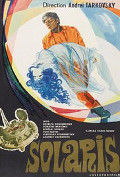
Directed by
Andrei Tarkovsky
167 minutes
Rated M
Reviewed by
Bernard Hemingway

Solaris (1972)
Tarkovsky's film, an adaptation of a novel by Polish author Stanislav Lem, is a strange hybrid of sci-fi movie, an unusual genre for the director, and his more familiar melancholic thematic concerns to do with memory and loss and visual stylistic devices,
Divided into roughly two halves, the first part of the film constitutes a kind of Chekovian get-together at a dacha where the main character, psychologist Chris Kelvin (Donatas Banionis), is meeting with cosmonaut Burton (Vladislav Dvorzhetsky) prior to heading to a Soviet space station circling Solaris, a planetary sea which apparently is playing tricks with the minds of the station’s occupants. Tarkovsky prepares us for what is to come by inter-cutting the get-together with a black and white film recording an investigation into the events, at which Burton appeared (apparently some years earlier).
The second part of the film concerns what happens when Kelvin arrives at the space station. He finds one crew member has suicided and the remaining two acting very oddly. Even more strangely a duplicate (Natalya Bondarchuk) of his late wife appears although she can’t remember who she is. Despite the fact that is she a creation of Solaris, Kelvin becomes convinced that they have been given a second chance and wants to return to Earth with her.
If the first part of the film is over-long and particularly with its dubbed dialogue feels flat, the second half of the film, although still suffering in some respects from these problems, explores some genuinely interesting ideas to do with the relationship between ideas and emotions, specifically it asks who do we love, when we love – the actual person or our idea of them? Indeed the film's closing sequence suggests that we are all islands in a sea of consciousness.
Show detailed review
Want something different?





